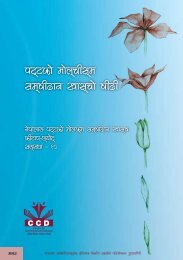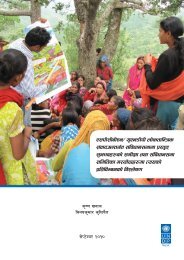The Dalits of Nepal and a New Constitution - ConstitutionNet
The Dalits of Nepal and a New Constitution - ConstitutionNet
The Dalits of Nepal and a New Constitution - ConstitutionNet
You also want an ePaper? Increase the reach of your titles
YUMPU automatically turns print PDFs into web optimized ePapers that Google loves.
<strong>The</strong> <strong>Dalits</strong> <strong>of</strong> <strong>Nepal</strong> <strong>and</strong><br />
a <strong>New</strong> <strong>Constitution</strong><br />
41<br />
that can be taken to court. <strong>The</strong> South African constitution,<br />
for example, does not have such unenforceable<br />
provisions, but it does have rights to access to housing<br />
<strong>and</strong> to health, which can be used as the basis <strong>of</strong> some<br />
sort <strong>of</strong> legal claim in the courts.<br />
Another type <strong>of</strong> weak, or ineffectual, provision has<br />
been that which requires a law to be passed. <strong>The</strong> 1990<br />
<strong>Constitution</strong> said that no-one must be discriminated<br />
against on the grounds <strong>of</strong> caste, <strong>and</strong> “Any contravention<br />
<strong>of</strong> this provision shall be punishable by law”. But if no<br />
such law is ever passed, the provision has very little effect.<br />
Sometimes the <strong>Constitution</strong> was interpreted as though<br />
it said “there must be a law”. <strong>The</strong> right to information<br />
was like this: it did not say there must be a law, but it<br />
seemed to be assumed that the right was <strong>of</strong> no effect<br />
unless there was a law, which was passed only very<br />
recently.<br />
Some rights were “given with one h<strong>and</strong> <strong>and</strong> taken away<br />
with the other”: the <strong>Constitution</strong> said that privacy is<br />
inviolable “except as provided by law”. This means that<br />
a law could take away the rights.<br />
<strong>Dalits</strong>, <strong>and</strong> other groups, preparing proposals for provisions<br />
in the new <strong>Constitution</strong> should guard against such<br />
provisions. And it would also be possible to provide for<br />
more active implementation <strong>of</strong> the <strong>Constitution</strong>. Some<br />
have suggested that the new <strong>Constitution</strong> should set up a<br />
special commission with the responsibility to ensure, as<br />
far as possible, that the <strong>Constitution</strong> is implemented. And<br />
it might also be possible to say that, if the <strong>Constitution</strong>s<br />
does need a new law, <strong>and</strong> no such law is passed, the<br />
courts should be required, as far as they can, to develop<br />
the law themselves to implement the <strong>Constitution</strong>.<br />
Helping Constituent Assembly<br />
Members to be Effective<br />
<strong>The</strong>re is little experience in the Dalit community about<br />
being members <strong>of</strong> parliament, <strong>and</strong>, since there has been<br />
little in the way <strong>of</strong> effective local government in recent<br />
years, there is little experience even at that level. Dalit –<br />
<strong>and</strong> other new members – will need support. That support<br />
can come in various forms. Some <strong>of</strong> it will be emotional.<br />
<strong>The</strong> work <strong>of</strong> the Constituent Assembly may at times be<br />
stressful, <strong>and</strong> people who have come to Kathm<strong>and</strong>u to<br />
be Constituent Assembly members may feel isolated if<br />
they are far from their homes <strong>and</strong> families.<br />
Other support will be practical. <strong>The</strong> members will need<br />
to be supplied with material to use in discussions. That<br />
material should include concrete suggestions for<br />
provisions in the new <strong>Constitution</strong>, as well as background<br />
information to support the suggestions. It will need to<br />
include material to counter anticipated objections to the<br />
situations that are made.<br />
Women members may need extra help <strong>and</strong> support. What<br />
will happen if they have children who depend on them at<br />
home? Members <strong>of</strong> the community should be prepared to<br />
help Constituent Assembly members with child care, to<br />
rally round if a woman’s family member should be sick.<br />
One <strong>of</strong> the first things that the Constituent Assembly<br />
will do is to adopt its rules <strong>of</strong> procedure. Thought should<br />
be given to ensuring that these facilitate rather than<br />
restrict the full participation <strong>of</strong> individual members. If<br />
the Constituent Assembly can sit all night this is likely to<br />
disadvantage women. If members must use <strong>Nepal</strong>i to<br />
address the Assembly, this may limit the participation <strong>of</strong><br />
members who are not confident about speaking publicly<br />
in that language. Rules should also prohibit the use <strong>of</strong><br />
expressions that are derogatory about any individual<br />
members or category <strong>of</strong> members.<br />
Responsibility <strong>of</strong> the Individual<br />
Members<br />
A heavy responsibility will rest on the 601 members <strong>of</strong><br />
the Constituent Assembly. Many <strong>of</strong> them will have limited<br />
underst<strong>and</strong>ing <strong>of</strong> the nature <strong>of</strong> a <strong>Constitution</strong>. This is<br />
natural. But it does mean that each member must accept<br />
the responsibility <strong>of</strong> trying to learn as much as possible<br />
about what is a constitution is <strong>and</strong> how it works. <strong>The</strong>y<br />
should also make sure that they underst<strong>and</strong> the positions<br />
<strong>of</strong> their party <strong>and</strong> also the concerns <strong>of</strong> their individual<br />
communities. No member should think <strong>of</strong> himself or<br />
herself as just “voting fodder” – someone whose<br />
responsibility is to vote as the party directs.


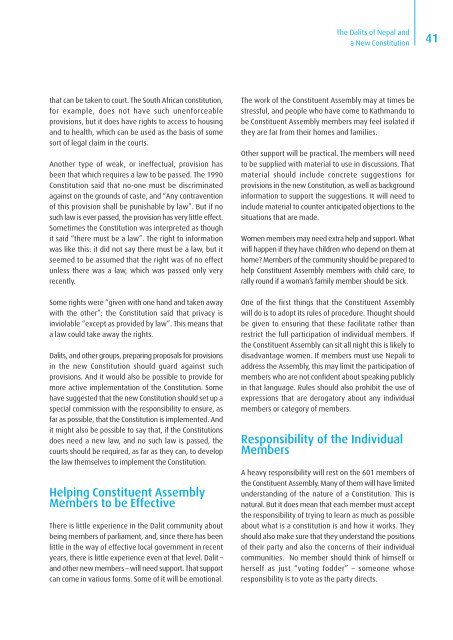

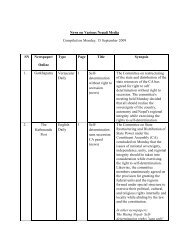

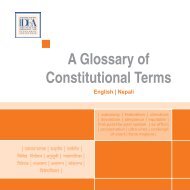
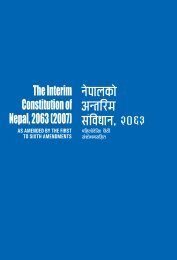
![g]k fnsf blntx? / gofF ;+l jwfg](https://img.yumpu.com/49483602/1/184x260/gk-fnsf-blntx-goff-l-jwfg.jpg?quality=85)
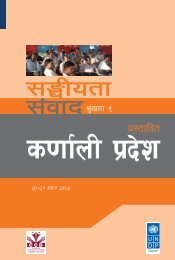
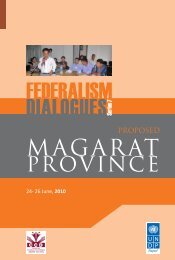
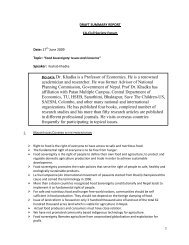
![+ljwfg;ef, /fHosf]k'g](https://img.yumpu.com/41604075/1/184x260/-ljwfgef-fhosfkg.jpg?quality=85)
